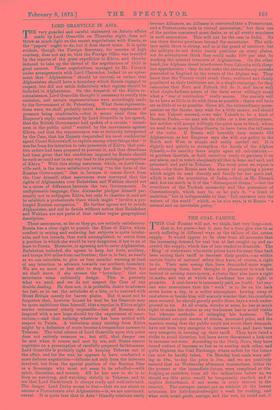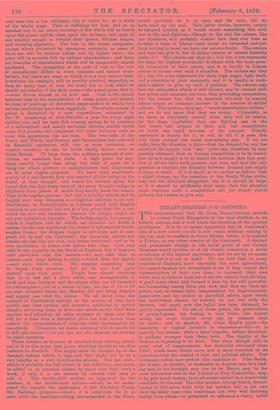THE COAL FAMINE.
THIS Coal Famine will not, we think, last very long—not, that is, for years—but it may for a time give rise to as much suffering in different ways as the failure of the cotton
supply. It would appear to be clear from all accounts that the increasing demand for coal has at last caught up and ex-
ceeded the supply, which has of late tended to diminish. The 'Ring' of coalowners who settle prices have for some time back been raising their tariff to increase their profits,—as within certain limits of national safety they have, of course, a right to do. Their men seeing this, have demanded more wages, and obtaining them, have thought it pleasanter to work less instead of earning more money, a choice they also have a right to make, and one at which no Londoner has any right to grumble. A coal-hewer is immensely paid, no doubt; but any- one who remembers that his " work ' is to lie on his back seven hours a day, in a sultry atmosphere, hewing away at coal above or beside him, will scarcely wonder that, his comforts once secured, he should greatly prefer three days a week under- ground to six. At all events, wonder or none, he has as much right to make his choice as any tradesman has to avoid visible but irksome methods of enlarging his business. The diminished out-put means, of course, increased price, and the masters seeing that the public could not resist their demands, have not been very energetic to increase work, and have been very energetic in running up their tariff. They have faced a strike to avoid dictation, but have never threatened a lock-out to increase out-turn. According to the Daily News, they have issued notices of increase so fast as to overlap each other, and quite frighten the Coal Exchange, where orders for the future can now be hardly taken. On Monday best coals were sell- ing at 48s., to-day the price is 500., and we are positively assured that on Wednesday afternoon transactions, either for the present or the immediate future, were completed at 60s. Judging as outsiders, from all the indications before us, we should say this price would be temporarily reached, and it implies disturbance, if not worse, to every interest- in the country. The cottager cannot get on without at the lowest minimum his half-hundredweight a week for cooking, and what with retail profit, cartage, and the rest, he could not, if
coal were 60s. a ton wholesale, buy it under 2s., or a sixth of his whole wage. That is suffering for him, and. so in another way is the severe economy of fire which will be forced upon the poorer middle-class, upon the artisans, and upon all not wealthy enough to rebuild their grates, kitchen ranges, and warming apparatus. The loss to the steam companies, except where protected by enormous contracts, as some of them are, will be ruinous unless met by higher rates ; the price will be severely felt by railway shareholders ; and there are branches of manufacture whieh will be temporarily almost paralysed. The proportion of the cost of coal to the cost of manufacture differs in every business and almost every factory, but there are some in which it is a very serious item. Ironworks, for example, will be terribly pinched, expending as they do many tons of coal for every ton of iron, while we should not wonder if the daily press,—the penny press, that is, —were driven almost to its wits' end. Coal is the second heaviest item in the manufacture of cheap paper, and already we hear of meetings of disturbed paper-makers at which very serious resolutions have been suggested. The whole system of prices is disturbed by a new expenditure, estimated by Sir W. Armstrong at £44,000,000 a year for every eight shilling rise, and we may this coming spring be in presence of a wide-spread and nearly universal distress, amidst which some fifty persons and companies will make fortunes such as even this generation has not seen. The rent-rolls of the Vanes, and Wards, and Gowers, and Cavendishee this year will be financial curiosities, will rise in some instances, we suspect, certainly in one, to levels hardly known even in Great Britain. Of hope from the ordinary methods of alle-
viation we entertain but little. A high price for any- thing usually brings that thing, but then it must be a thing for which growers or manufacturers and shipowners are in some degree prepared. We have read somewhere a story of a well-known firm who secured all the indigo in the world, as they thought, and hoped for colossal gains, but found that the first sharp turn of the screw brought indigo in shiploads from places of which they hardly knew the names. That is the regular process ; but coal is a bulky article, and its freight over long distances is a frightful addition to its cost. Beerbhoom, or Pennsylvania, or Labuan could feed English furnaces to any extent, but not at a less price than 60s. a ton, which the new and enormous demand for freight might for one year indefinitely increase. The Indian supply, for example, which is limitless, and for which our furnaces are fitted, is useless, for the coal would cost 85s. before it had reached South- ampton Docks; the Belgian supply is not large, and is com- peted for by half the Continent ; the American miners and owners are just like our own, only better combined ; and as for new production at home, new mines take time. Coal may exist in any quantity in the South of England, but it does not exist unworked near the surface—we may take that as certain—and deep sinking is costly—which does not signify —and slow, which does. We suppose something may be hoped from economy, but we do not feel quite assured upon that point. People bear almost anything that is to last but a little while, our arrangements in brick and iron, furnaces and fire-places alike, are all intended for extravagance, and as a matter of fact, the rise of 70 or 80 per cent. recorded before last Monday did not bring demand and supply one whit the nearer. We all know, from the example of Continental capitals in the matter of rent, how quietly men bear sudden and excessive additions to special charges, accepting them in their own minds as the chief fixed expense, and adjusting all other expenses to them, and they will for a time bear a threefold price for coal, sooner than endure the inconvenience of reducing their consumption by two-thirds. Ultimately, no doubt, economy will do much, for it will call science to its aid, but for the moment we distrust its rapid operation.
There remains an increase of out-turn from existing mines, and it is to this point that grave attention should in the first instance be directed. The supply must be brought up to the demand, behind which it lags, and this ought not to be a very lengthy or a very troublesome process. Ten per cent., which is probably the full extent of the deficiency, can surely be added to an out-turn earned by about four days' work a week, if only it is the interest of owners and men to add it. The double-shift system, as suggested by the masters, or the double-turn system—which, as we under- stand the reports, the spokesman of the Northern Union, Mr. Halliday, proposes—would, it is admitted, do it at num, while the machine-cutting, recommended in the Times,
would probably do it at once and for ever, till we have used up our coal. This latter device, however, cannot be adopted quickly, as it would create something like civil war in the coal districts—though in the end the miners, like the threshers, will probably wonder how they ever bore so terrible a form of labour—and about an increased out-put from hewing by hand we have one serious doubt. The owners and men can give it, but do either owners or miners honestly desire it ? The owners say they do ; but 50s. a ton represents for them the highest procurable dividend with the least possi- ble exhaustion of their mines, and it is hardly in human nature to mourn over such a situation. The miners say they do ; but 50s. a ton represents for them high wages. light work, and a retention of their monopoly, and it is hardly in work- men's nature to give up such a position. The owners may face the exhaustion which is still distant, and be content with low prices and immense out-turn, thus precluding competition, but the miners fear that an immense out-turn by manual labour means an immense increase in the number of skilled colliers. The masters, they say, "would manufacture colliers," and we do not know that they are wrong. Ultimately, as we have so frequently warned them, they will be beaten, for the huge capitalists they are fighting can in the last resort call science to their aid, but immediately we doubt any rapid increase of the out-put. Nobody concerned is hearty for it, or will be till it is seen that only large out-put can make coal-mining pay. If we are right, then the situation is this,—that the demand. for coal has exceeded the supply, that "any" price can, therefore, be tem- porarily obtained, that no foreign competition is to be feared, that no new supply is to be feared for months, that this posi- tion of affairs snits both masters and men, and that the only question is whether the disparity between demand and supply is large or small. If it is small, as we incline to believe, then a slight change-, say the cessation of the South Wales' strike, may end the situation altogether, but if it should be large, or if it should be artificially kept large, then the situation must continue until a competition not yet clearly visible induces the owners to give way.



































 Previous page
Previous page